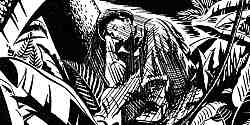|
A Radio Talk by Charles F. Kettering  Down through the years we have fought the cause of this disease with sanitation, mosquito netting, by oiling stagnant pools and with insecticides. And we have combatted the disease itself with Atabrine and - quinine. Atabrine is a substitute material but it is not synthetic quinine. Today, we all know the importance of quinine, and so did the Belgian, Van der Heyden 300 years ago when he wrote about the healing value of an extract from the bark of the Cinchona tree. So did the French chemists Pelletier and Caventou, the first ones to isolate pure quinine from the extract over a century ago. And so did Pasteur when he made quinotoxine from quinine in 1853. |








